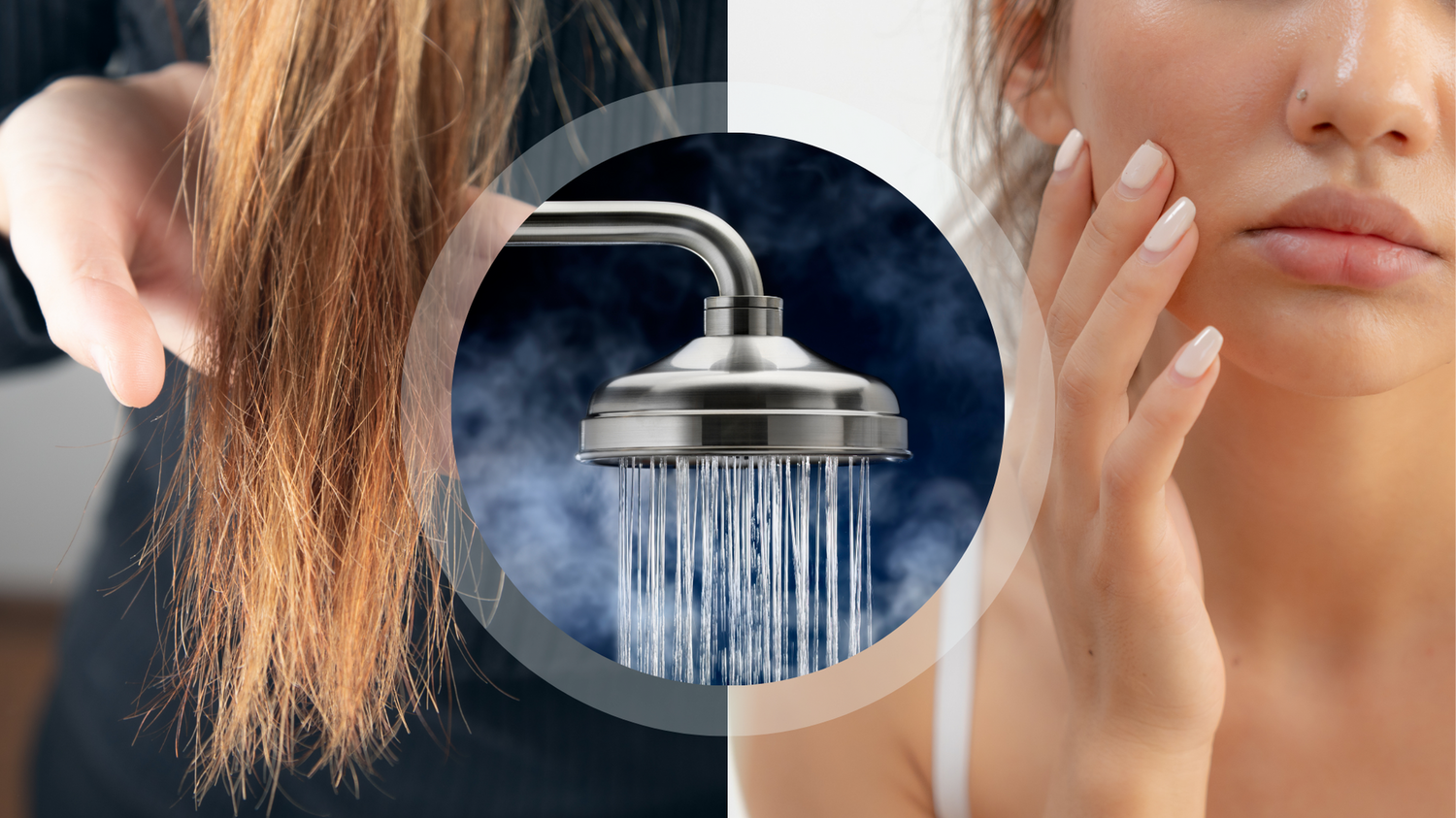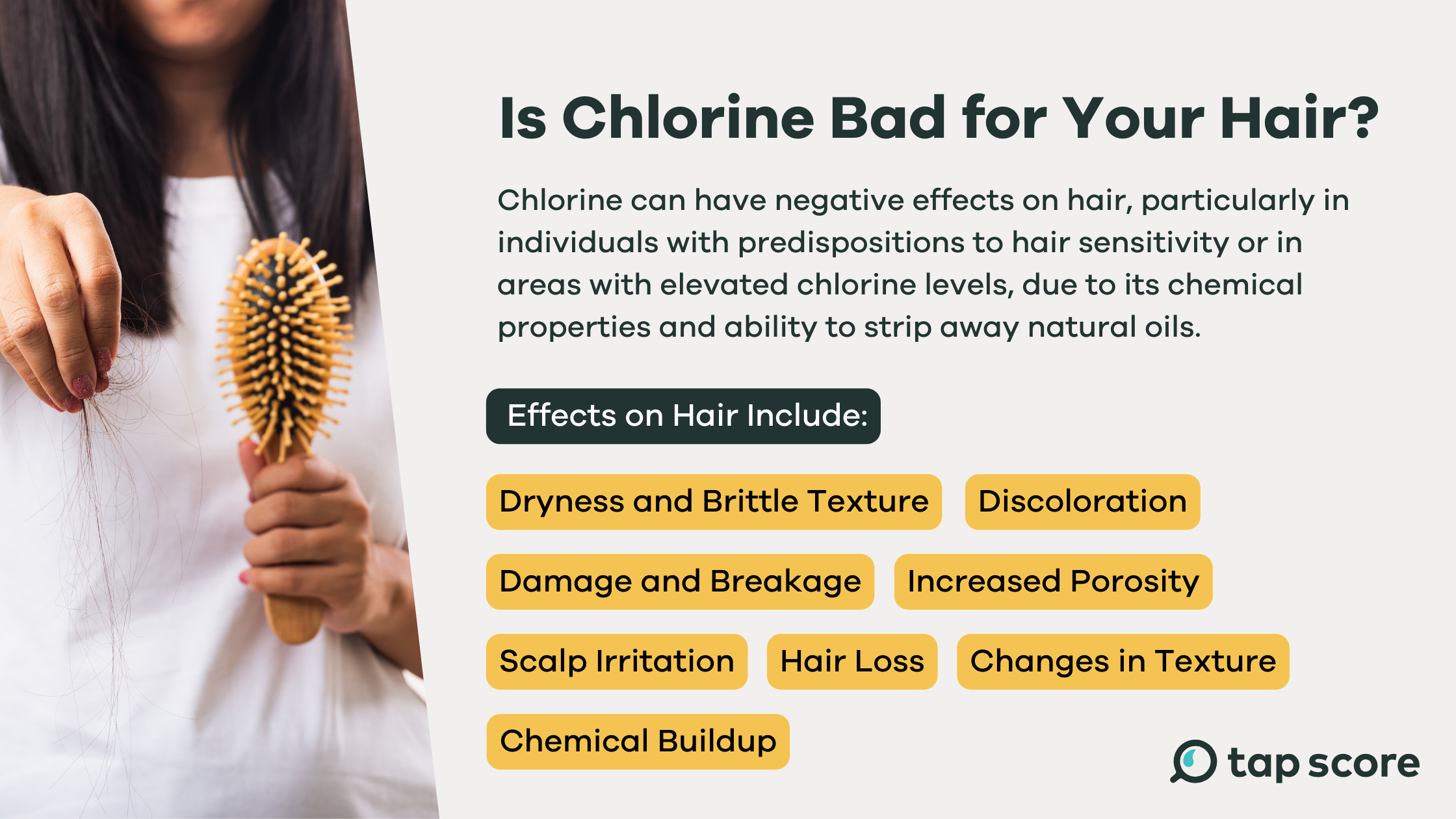
Ultimate Guide: Tap Water Effects on Hair and Skin
Our blog is written by real experts— not AI. Each guide is carefully reviewed and updated based on the latest research. Plus, with no affiliate links, you can count on unbiased insights you can trust.
What are the effects of tap water on your hair and skin? Some of the more common skin and hair issues people with sensitive dispositions can experience with tap water include the effects of hard water on dandruff and eczema, frizz, grease, and discoloration, and more. while debunking some common myths and misconceptions.
In the following ultimate guide, we’ll cover many of these issues, debunk some common myth and misconceptions, and explain if you might be experiencing these issues from the water coming out of your tap or not.
Table of Contents:
-
Tap Water and Hair
Dry or flaky hair and scalp, dandruff, seborrheic dermatitis, flat hair, hair loss, even green hair. -
Tap Water and Skin
Dry or itchy skin, irritation, rashes, hives, acne, eczema, or psoriasis. -
Common Misconceptions
Water allergies, hair loss, premature graying. - What’s the Takeaway?
Primary Culprits in Tap Water Affecting Your Hair & Skin
While tap water is regulated to a baseline standard for human consumption, there is still a lot of variability in the specifics of everyone’s water quality chemistry. Different concentrations of certain substances in your tap water might cause problems for your hair and skin if you’re particularly susceptible. It’s a clear case of the “dose makes the poison” for sensitive persons. The two most common reasons tap water—including well water—might negatively impact your hair and skin are:
- Chlorine/chloramine
- Hard water

Tap Water Effects on Hair
Is Chlorine Bad for Your Hair?
The short answer is yes. Chlorine—added to all public water supplies to safeguard water from potentially dangerous microorganisms—and its byproducts strip away the natural hair and skin oils that protect your body from over-drying. However, many people don’t notice the effects of chlorine in their drinking water—even on hair and skin. On the other hand, some people are sensitive even to very low levels of chlorinated water.

Side effects of chlorine on hair include:
- Dry or flaky scalp
- Dry or brittle hair
- Dandruff
- Ineffective hair dyes
- Green or greenish-tinted hair
Additionally, leaving chlorine in hair overnight can exacerbate dryness and brittle conditions. If you have tap water that is high in chlorine, it’s best to avoid washing your hair before bed.
Does Chlorine Cause Hair Loss?
Studies have found that while chlorine affects the texture and color of hair, it has not been directly linked with hair loss. For the average person (someone not exposed to a serious toxin or poison—e.g., radiation, mercury, etc.), premature hair loss is a combination of various factors including genetics.
Why Is My Hair Green?
Hair that turns green or has a greenish tint is typically caused by one of two things:
-
Chlorine
Greenish, brittle hair due to chlorine in the water is common among those with blond or light-colored hair who spend a large amount of time in water with high concentrations of chlorine, like swimmers.
-
Copper
Hair might also take on a green tint if your tap water has excessively high concentrations of copper. When copper undergoes a chemical reaction known as oxidation, it turns green. Oxidized copper in contact with hair has been linked with giving hair a greenish tint.
The most common way for copper to get into your tap water is through the corrosion of copper pipes, faucets, and appliances. A sign that high levels of copper are in your water is if you notice blue-green stains on your clothing and fixtures, or if your water has an unfavorable metallic taste.
The Complete Guide to Discolored Water
Chlorine in Public Water Systems
If you are on city water, your utility is adding disinfectants like chlorine or chloramine to your water. If you’re unsure which one your utility uses, we can look it up for you. Most people will have chlorine in their water.
For utility customers concerned about their chlorine levels, we recommend our Advanced City Water kit since noticeably high chlorine levels may indicate the presence of additional contaminants in the water you drink.
Is Hard Water Bad for Your Hair?
Hard water—or water that has elevated concentrations of positively charged molecules, namely magnesium and calcium—isn’t great for your hair, especially if you know you have a sensitive scalp. While these minerals are important for nutrition in the water you drink, they don’t have the same beneficial impacts on hair and skin.
There are many telltale signs to indicate you have hard water: you might notice a mineral deposit, known as scale, on your faucets, other plumbing appliances, and gray stains on your glassware. Hard water also makes it harder to get a rich lather from soaps and shampoos and produces soap scum that clings to shower walls and fixtures.

Hard water effects on hair include:
- Dull and/or dry hair
- Negative impacts on hair dyes/artificial coloring
- Dry, itchy, or irritated scalp, seborrheic dermatitis
Does Hard Water Cause Dandruff?
Yes, hard water can lead to dandruff. Dandruff is a mild form of seborrheic dermatitis. Mineral buildup in hair washed with hard water can lead to the excess build up of oils in the oil glands and hair follicles that lead to the condition.
Does Hard Water Make Your Hair Greasy?
While hard water is more associated with dry or dull hair, the minerals in hard water can cause your scalp to overcompensate with oil production. Furthermore, hard water can interact with shampoo and conditioner effectiveness, making your hair feel greasy.
Does Hard Water Cause Hair Loss?
Studies have actually shown that there is no clear link between hard water and weaker tensile strength, which would lead to eventual hair loss. Premature hair loss is largely a combination of various factors including genetics.
Does Hard Water Cause Flat Hair?
Hard water is more typically associated with dry or frizzier hair. Hair often looks flat with soft water, usually because soft water removes shampoos and conditioners from hair less effectively.
What Does Well Water Do to Hair?
Private wells typically draw their water from groundwater sources, like aquifers, which mean they are often richer in hardness minerals and potentially heavy metals such as arsenic, which can interact with your hair.
Owning a property with a private well comes with a full set of responsibilities: Along with your well’s condition and the quality of your water, dealing with changes to your hair (or skin) will involve some investigation into your water source. The first thing we recommend to all private well owners is to have their water tested by a certified laboratory.
Certified lab tests provide a baseline picture of your water quality so you can better understand your well water’s contaminant profile. Typically, chlorine is less of an issue for well owners, especially if they flush their system adequately after a shock chlorination regimen. Testing your water helps you better understand how your well water interacts with your hair and skin.
Well water hair care typically involves researching demineralizing shampoos and conditioners, as well as looking into shower head filters and water softeners.
Tap Water Effects on Skin
Just as with hair above, tap water can have negative effects on sensitive skin and those with preexisting skin conditions for reasons beyond just chlorination and hard water minerals. Once again similar issues may crop up from a variety of sources.
Is Chlorine Bad for Your Skin?
Chlorine, as mentioned above, is not great for your skin because it strips it of the natural oils that prevent overdrying. So does chlorine dry out your skin? Yes, it does.

Effects of chlorine on skin include:
- Dry, or itchy, irritated skin
- Flare-ups of eczema or psoriasis
- Chlorine rash (redness, tenderness, inflammation, lesions, flaky crusts, or hives)
Chlorine Allergy vs Chlorine Rash
Typically, chlorine levels must be quite high for “irritant dermatitis” to occur. Irritant dermatitis is a rash, not an allergy to chlorine. Chlorine is not an allergenic substance. Chlorine-related rash is not common from showering or bathing at home. It is also typically an issue for those with skin highly sensitive to chemical irritants.
Is Hard Water Bad for Your Skin?
Because of the excess minerals, hard water—which can bind to surfactants found in soaps and cleansers—can leave a residue on your skin that clogs pores or otherwise disrupts the skin barrier. Hard water skin issues include:
- Dry skin
- Irritation and/or rash (in sensitive persons)
- Exacerbating preexisting skin conditions like acne, psoriasis, eczema
Can Hard Water Cause Acne?
Hard water itself cannot cause acne, but its properties can exacerbate skin conditions by clogging pores or disrupting skin’s natural oils.
Can You Get a Rash from Hard Water?
While hard water cannot cause dermatitis itself, it can exacerbate pre-existing conditions or even initiate a flare-up of conditions like eczema, psoriasis, or rosacea.
Rashes and Skin Conditions (like Eczema) from Tap Water
For those with sensitive skin or known skin conditions (e.g., eczema, psoriasis, acne, rosacea, etc.), unfiltered tap water may disturb the natural balance of skin flora (also known as the skin microbiome). Depending on the concentrations of contaminants, this can initiate or exacerbate flare-ups.
Can Tap Water Give You Acne?
When it comes to tap water, certain characteristics and contaminants may exacerbate or contribute to the development of acne in susceptible individuals.
- High pH Levels: Water with a high pH level may disrupt the skin’s natural pH balance, which is typically slightly acidic around pH 5.5.
- Microbial Contaminants: If water is not properly disinfected, bacterial contaminants can be present. This is primarily an issue for private well owners. Direct contact with such water can lead to bacterial growth on the skin, increasing the risk of acne and other skin infections.
It’s also important to understand that, as with chlorine and hard water above, many of these might not be the root causes of irritation, but will worsen the condition. For example, pH—which in itself does not cause issues—will worsen already present rashes and conditions when at extremely low or high levels.
Tap water effects on skin can range from hives and rashes to gently itchy skin after showering. These effects vary greatly between individuals, especially for those with a greater sensitivity to heavy metals. Tap water contaminated with unsafe levels of heavy metals will be detrimental to skin health, although these levels are higher than what regulations deem safe for drinking water.
Water contaminants that can impact skin include:
- Chlorine
- Hard water minerals
- Heavy metals (particularly iron, chromium, copper, and nickel)
- Various bacteria
What Can You Do About Tap Water Contaminants?
If rashes are caused by any of the contaminants above it’s important to first determine what is specifically in your water.
For those on public water systems (like a municipal utility), The Essential City Water test provides an useful baseline picture of your water quality.
Common Misconceptions
Of course, as with all things personal (like hair and skin), tap water and its effects can get misconstrued.
Hard Water vs Soft Water and Issues with Soaps and Shampoos
Hard water can impact soaps’ and shampoos’ ability to lather. It also leaves behind a scum. It causes dry hair conditions that your scalp overcompensates for through the overproduction of oils.
Soft water can make soaps, shampoos, and conditioners harder to rinse off of your hair and skin. This can also cause less-than-desirable results like greasy or flat hair, or oily skin.
Is it Possible to Be Allergic to Water?
An allergy to water, or aquagenic urticaria, is an extremely rare condition that causes the skin to break out in hives when in contact with water, the hives lasting about 30-60 minutes.
As of a 2017 study, only 37 known cases of aquagenic urticaria have been found in medical literature dating back to 1964. So chances are, you’re not allergic to water. Rather, your skin is highly sensitive to other contaminants in the water.
Can Hard Water Cause Gray Hair?
No. Despite what you may have heard, hard water itself cannot cause your hair to gray prematurely. As with hair loss, the loss of pigment in your hair follicles can be caused by a variety of factors—including genetics. Chlorine won’t turn your hair gray or white, either.
On the other hand, gray or white hair can be discolored or tinted yellow from a variety of environmental factors—everything from hard water’s mineral content to nicotine exposure.
Do Shower Filters Really Work?
That depends. Understanding what’s in your water is the first step toward choosing the correct treatment device. Not all filtration technologies treat all aspects of water quality that could be causing hair and skin issues. Additionally, you’ll want to take stock of where your water comes from. Our core kits cover everything you need to test for to make an educated decision:
What’s the Takeaway?
- The most common reasons your tap water can be causing hair and skin issues for sensitive persons are:
- Water hardness
- Chlorine & chloramine
- pH levels
- Always test your water before you treat your water. This will allow you to pinpoint what contaminants are in your water, which, in turn, will help you zero in on what could be causing your hair & skin issues.
Read More
▾Quick Guide: Chlorine and Chloramine in Drinking Water
What’s the White Residue on My Fixtures?
Do I Need a Water Softener?
The Complete Guide to Discolored Tap Water









